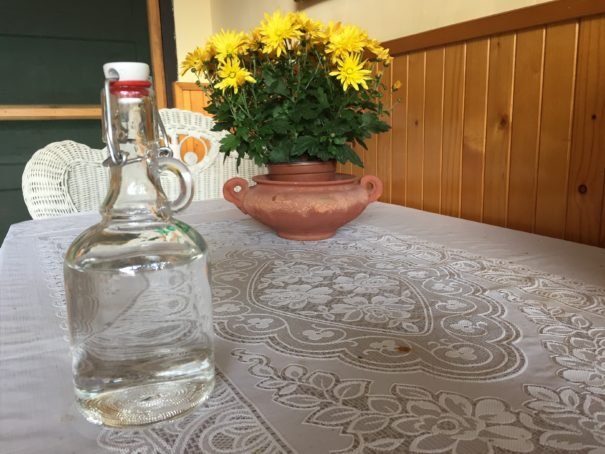
Fired Up, Ready to Squirt Minced Meat Into Pig Intestines

Fired Up, Ready to Squirt Minced Meat Into Pig Intestines
Palinka in Hungary
Thick chunks of flabby raw meat were slapped down onto the sturdy wooden chopping-board in front of me. A razor-sharp butchers knife with a worn blue handle was thrust into my hand.
As quickly as I could cut the slippery slices, a huge Hungarian chucked them into a hand-powered grinder and pumped the wheel to make sausage meat. The brutal task required elbow grease and grunt, so our team of five took it in turns to process the pork.
All around us were other sausage-makers dressed in colorful costumes, squarely focused on winning first prize at the Csabai Kolbászfesztivál, an annual sausage festival held in the Hungarian town of Békéscsaba, near the Romanian border.
Being a Brit with zero grasp of the Hungarian language, I buried myself in the sausage-making task at hand. Once we had minced 10 kilograms of the stuff, I sat down heavily on the wooden bench as a wave of fatigue passed through my body.
The Hungarian team leader, Zsolt, reached into a basket that lay on the table and fished out five tin shot glasses and an unlabelled glass bottle containing the Hungarian hooch called palinka. He dispensed the clear tonic and everyone stood up, shouted “egészségedre!” and downed the shots.
Sweet when it first touched the lips, this feisty fruity fusion was somehow less fierce than vodka or grappa, but it quickly turned to fire as it worked its way down my throat. That batch was made from plums and, even before the taste of the fruit faded, I felt fired up, ready to squirt the minced meat into pig intestines to produce a sausage-string fit for a king.
As we worked our way through the pile of meat (and the rest of the palinka) I noticed a tall, balding man with a wide smile moving through the crowd. He was in great demand, with every team trying to shake his hand, get a photo and stuff some sausage his way. This man was Pál Győrfi, one of the sausage judges, and a national treasure through his work as the spokesman for the Hungarian ambulance service.
Charismatic and handsome in a way that would work well on the nightly news, Pál stopped near our spot and I jostled through the crowd to meet him and explain that our team was composed of three Hungarians, an American from Philadelphia, and a Londoner.
“It is nice you are here,” he bellowed in English tinted with only a slight Hungarian accent. “Most other people are Hungarian, we should have foreign people, too.”
As the iPhone cameras snapped shots of the two of us I felt all warm and fuzzy inside. Was I a pioneer, an explorer of some kind, or was that just the afterglow of the palinka, ignited by a sprinkling of celebrity stardust?